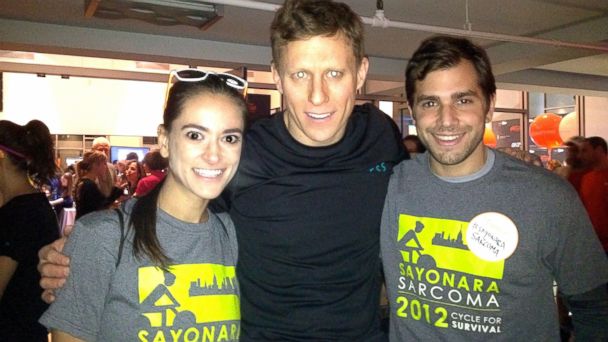A Man's Battle Against Bone Cancer Raises Awareness of Rare Disease

David Munczinski pictured with fiancee Christina Tafaro and Cycle for Survival co-founder David Linn. (Image courtesy: David Munczinski)
By Edo Paz, M.D.
It started with mild back pain - a seemingly minor issue that David Munczinski chalked up to a recent hiking trip.
That was in the summer of 2011. Munczinski, then a 28-year-old enrolled in business school at Wharton, expected the discomfort to subside. But when the pain persisted for several weeks, he made an appointment with a doctor. That visit led to an X-ray - and that test, in turn, led to a shock.
The X-ray revealed a baseball-sized tumor near his left shoulder. Munczinski was diagnosed with Ewing's sarcoma, a rare cancer of the bones that is most common in children.
"I felt like my blood went cold," Munczinski recalled. "I started praying. I was so scared to tell my family and my girlfriend."
By the time fall came, Munczinski had to take a leave of absence from Wharton to undergo treatment at Memorial Sloan Kettering Cancer Center, including six months of chemotherapy and radiation. He re-enrolled in the spring after scans suggested he was cancer free. But in January of 2013 the cancer came back, and he had to take a second leave of absence from school. This time he underwent an open-chest surgery to remove the cancer.
But treatment did not keep him down. Throughout his battle, he and his girlfriend, Christina Tafaro, created a team to ride in Cycle for Survival, an indoor team cycling event that raises money for rare cancer research.
A "rare cancer" - like the sarcoma that changed Munczinski's life - is one that affects fewer than 200,000 individuals, although taken together they account for half of cancers in the United States. Currently, Cycle for Survival is the only fundraising event that raises money solely for rare cancers, and 100 percent of the funds raised at Cycle for Survival go directly to Memorial Sloan Kettering Cancer Center for rare cancer research.
This money is crucial to develop new treatments, said Dr. Richard Carvajal, director of developmental therapeutics and a medical oncologist at the New York City hospital.
"Funding for rare cancers is challenging these days," Carvajal said. "Cancers that are more prevalent tend to get a greater amount of attention, whereas cancers that affect a fewer number of patients tend to get less attention and funding."
Since Cycle for Survival's inception in 2007, the event has raised over $49 million for rare cancer research and has contributed to 85 clinical trials and research studies. One such study is Carvajal's research on another rare cancer known as uveal melanoma, a rare melanoma arising in the eye. The research eventually gave rise to the first systemic therapy to treat advanced cases of this disease.
"We brought this therapy to patients, and this wouldn't have been possible without funding from Cycle [for Survival]," Carvajal said.
As for Munczinski, two weeks after recurrence was discovered and just two days before his open-chest surgery, he asked Tafaro to marry him. She said yes.
And just like the year before, Munczinski captained team Sayonara Sarcoma in March 2013. The team raised over $20,000 in 2013 - bringing the two-year total for the team to over $40,000.
This weekend, Munczinski plans to ride again in the eighth Cycle for Survival. And this time, he will have something extra to celebrate. Munczinski completed his second course of radiation and chemotherapy by the summer of 2013. By January 2014, scans indicated that he was cancer-free.
Now, after a long journey, Munczinski is focused on building a software start-up in New York City, and planning his wedding to Tafaro later this year.
To learn more about Cycle for Survival and donate, visit cycleforsurvival.org.